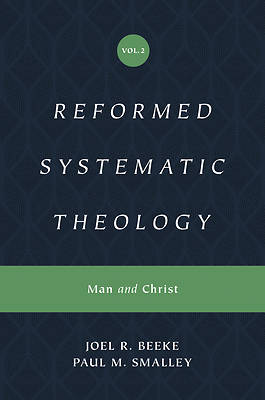⏱️ Estimated Reading Time: 5 min read
Introduction
I am a huge fan of systematic theology. There is nothing that so informs my mind with God’s truth, warms my heart with God’s love, and motivates me to serve God as studying His Word set forth in systematic theology. For this reason, I am so enthusiastic about recommending the newest volume in the Reformed Systematic Theology series by Joel Beeke and Paul Smalley. I do not hesitate to say that, although only two volumes in with more on the way, this is my favorite systematic theology. Dr. Beeke and Dr. Smalley have done such a tremendous service to the church with these volumes, and I am confident that they will leave a lasting legacy for generations to come.
Overview
Volume 2: Man and Christ is a welcome addition to the literature regarding Anthropology and Christology. This book is divided into six sections (3 sections for each of the two main doctrines). The first part of the book, Anthropology, is divided between the doctrine of creation, the doctrine of man’s creation and nature, and the doctrine of sin. Highlights from this section include a much-needed defense of a literal 6-day creation and a historical Adam, a tremendous and thorough discussion on the nature of the image of God in man, a fantastic defense of the reformed doctrines of original sin and total depravity, and finally, deeply pastoral chapters regarding believers and sin and suffering. The authors address man’s essential nature, gender, and sexuality as revealed in God’s good design in creation, a discussion of God’s covenant with Adam, the fall of man into sin, and much more.
The next part of the book is devoted to Christology. This section is divided into three parts, which include the doctrine of the Covenant of Grace, the doctrine of the Person of Christ, and the doctrine of the Work of Christ. Highlights from this section include a persuasive argument for understanding the covenant of grace in the storyline of Scripture, a fantastic four-part defense of the incarnation of Christ (wonderful reading this past Christmas!), and a riveting discussion of the work of Christ, focusing on his work as our Prophet, Priest, and King. The authors set forth an argument for a covenantal approach to understanding the Scriptures, addressed the importance of the virgin birth, defended the deity of Jesus Christ in a powerful manner. The following quote is just a small sample of the richness of this work:
“The man who was born in Bethlehem preached in Galilee, and was crucified outside of Jerusalem is far more than a man. He is the eternal Lord, living and active from the first moment of history, and hence rightly named “Alpha and Omega, the beginning and the end, the first and the last” (Rev. 22:13). His resurrection did not give him a new kind of life that he never before possessed, but manifested through his risen humanity the eternal life that was always his (John 11:25).”[1]
Analysis
This work is thorough, leaving no stone unturned as it mines the riches of God’s Word on these two important doctrines. At a little under 1,200 pages, this book is a comprehensive treatment of these doctrines. This allows the authors to go into much greater depth than the author of a single-volume Systematic Theology could. One should not conflate thoroughness with a lack of readability. However, this work is quite readable, avoiding unnecessary technical jargon and references to the original language. While this book is comprehensive, it can be read and understood by spiritually mature laymen. I also appreciate the deep respect for history.
This book is abounding with quotations from theologians across church history, emphasizing the Reformers and the Puritans. Entire chapters are devoted to historical surveys of key doctrines, which is tremendously helpful and missing in so many works of systematic theology. This book is also polemical. It engages with controversial subjects and argues with those who would teach false doctrine yet still retains a sense of warmth and gentleness that is too often missing in our contentious age. It collides with our sinful culture without coming across as antagonistic. Finally, this book is deeply devotional, always giving attention to the practical application of each doctrine. I also appreciate each chapter closing with a hymn and application questions, making this a deeply valuable resource for small group study and worship leaders.
What makes this work truly special, however, is the marriage of readability and depth. It is a rare gift to be able to take difficult concepts, go into depth in a discussion of them, and communicate them clearly and understandably. It is precisely this gift that makes the best communicators special. Compared with every other systematic theology that I’ve read, this book strikes the balance better than any I’ve ever seen. Because of this, this volume will be a resource I turn to time and again for the doctrines of Anthropology and Christology. If you’ve read a single-volume systematic theology such as Wayne Grudem’s and are interested in digging a little deeper into individual doctrines, this series is perfect for you. I heartily recommend this work and eagerly away the next volume in this series.
I am grateful to Crossway for a copy of this book in exchange for an honest review. To get your copy of Reformed Systematic Theology, click here.
[1] Joel Beeke and Paul M. Smalley. Reformed Systematic Theology Volume 2: Man and Christ. (Wheaton, IL: Crossway), 2020. 766.



